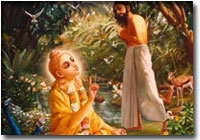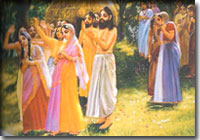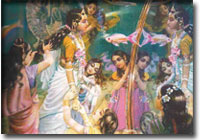KARDAMA AND DEVAHUTI
Kardama, Brahma's son, was a great yogi and a sage.
Prompted by Brahma to create progeny, he engaged himself with severe penance for a thousand years on the banks of the Saraswati to reach his aspiration through His grace.
|

There was a great sage named Kardama who lived on the banks of the river Saraswathi and did penance. After many years of penance the Lord Vishnu appeared before him and blessed him saying that he will be soon blessed with a beautiful wife and nine daughters who will be the mothers of great Rishis, and a son who will be none other than Vishnu. He also told that Kardama can spend his rest of life in meditation till finally he see's the Lord alone in the entire universe, and the entire universe in him. Saying this, the Lord disappeared. After a few days from this, King Manu who was looking for a groom for his daughter Devahuti went in search of the right person for his daughter. Finally he came across the hermitage of Kardama and was very impressed by Him who had a glowing face with the glory of his tapas and he was pouring oblations into the sacred fire. The King Manu was also carried away by the beauty of the hermitage and its surroundings. So Manu told him that he has come in search of a groom for his daughter Devahuti as directed by the great sage Naradha. Manu told Kardama that if he is willing he is ready to give his daughter Devahuti in marriage to the young sage. Manu was very impressed with Kardama's learning, wisdom and youth considering that he will be the best match for Devahuti's beauty, virtues and character. So Manu requested Kardama to accept her as his wife and help mate.

Kardama was also taken away by the fresh beauty of Devahuti and her charmness and so was Devahuti who liked Kardama at the very first sight. Kardama expressed his liking for Devahuti where even her shinning ornaments looked pale in comparison to her matchless radiance. But Kardama said that he can marry her under only one condition, that the moment a son is born to them, who will be a ray of Lord Vishnu, Kardama will go away, and undisturbed, he will perform penance for self realization. Manu and Satarupa were delighted and soon, Devahuti was given in marriage to Kardama. They lived a very happy life amongst nature and Kardama did hard life of penance and sacrifice engaging himself in great tapas. Devahuti also learnt to meditate from her husband and served him honestly and proved herself as a dutiful wife. Years passed on like this and finally after many years of penance nine girls were born to Kardama and Devahuti who were beautiful and virtuous maidens. Then the time came for the Lord to enter into her womb and so the Lord entered the womb of Devahuti and was born in the world as Kapila.When Kapila was born, the devas and Gandharvas blessed him and showered flowers from the heaven.

Naradha, Brahma, the four Sanatkumaras and the nine Prajapatis, all came to visit Kardama and Devahuti and the lord in the disguise of Kapila. Now with great joy Kardama gave all his nine daughters in marriage to the nine Prajapatis. Soon after the marriage they went to their own ashramas. Kardama knew that now the time had come for him to go and do greater penance as the Lord had already instructed to him. He went round his son Kapila, the divine Lord and prostrated before him. Then he bid goodbye to his wife Devahuti and went away from the ashrama and became a monk spending the rest of his life in deep meditation realizing the presence of god in him. Devahuti was very much proud of her son's knowledge and one day she went to him and asked Kapila to teach her how to gain freedom from birth and death. Kapila with a big smile and affection said his mother that he is ready to teach her lessons on the topic of gaining freedom from this cycle of birth and death. Thus Kapila taught his mother the reality of life and excellent things about the Lord's divine nature. Devahuti followed her son's teaching and reached the state of sainthood.








